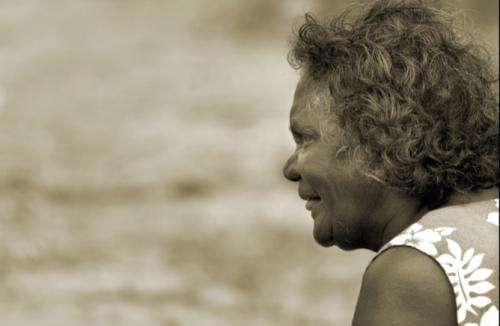Prescription for healthy food in remote Indigenous communities

Doctors should be able to provide subsidised "prescriptions" for healthy food to people in remote Aboriginal communities, says an Indigenous nutrition expert.
Professor Kerin O'Dea, Professor of Nutrition and Public Health in the Health Sciences Division of the University of South Australia, made the call after a study she co-authored found that people in three remote Aboriginal communities ate mostly processed foods high in sugar and salt and low in fruit and vegetables.
The study is published today in the Medical Journal of Australia.
The study collected data on food purchased in three remote Northern Territory communities over a 12-month period and examined food expenditure, estimated per capita intake, nutrient profile and density relative to daily requirements, and major nutrient sources.
The study found that one-quarter of total food expenditure was spent on non-alcoholic beverages, with 15.6% spent on sugar-sweetened soft drinks. As little as 2.2% of money spent went on fruit, and only 5.4% on vegetables. Sugars contributed between 25.7% and 34.3% of energy, of which 71% was refined sugar and sugar-sweetened drinks.
"People in the study communities spend more on food ($379 to $418 per person per month) compared with the expenditure estimated for other Australians ($314 per person per month)," the study said.
Professor O'Dea said the study highlighted the high cost of food in remote communities, especially perishable foods like fresh fruit, vegetables, and lean meat which should be staple foods.
"We should consider subsidising healthy foods for low income people in remote parts of Australia. I suggest we could have such a system incorporated into primary health care, doctors should be able to provide 'prescriptions' for healthy food," Professor O'Dea said.
"We spend huge amounts on people once they are ill, but are reluctant to support people to remain healthy."
Dr Vicki Flood, Nutritional Epidemiologist and Associate Professor in Public Health at the University of Woolongong said she could see value in incorporating food prescriptions into the primary health care system to help highlight the importance of a healthy diet.
"Medications are very costly and yet we could achieve improved health with better support for healthier diets, and would likely be a much smaller proportion of other health costs," Dr Flood said.
"It could be implemented with a whole suite of preventive health strategies. This might include: better access to more affordable healthy foods (eg. reduced cost for fruit and vegetables, including subsidy of transport costs); good interpretative front of pack labelling like traffic light labelling to make it easier for people to identify healthier food choices; support to build capacity among Aboriginal communities about food and nutrition, etc."
"You want to give people some scope to have healthy food in their diet but you still want them to be free to make that choice. I think it is about encouraging healthy choices to be easier choices."
Dr Annabelle Wilson, Public Health Research Fellow at Flinders University said supporting people to remain healthy using a strengths-based approach was vital.
"As the authors suggest in the paper a cost benefit analysis of improved dietary intake on health outcomes is an important part of demonstrating why and how this could be done," Dr Wilson said.
"There is no doubt that the cost of food in remote communities needs to be addressed, in particular the cost of healthy food,"
"I would advocate for a system that reduces the cost of healthy food at the community level, focuses on the health and well-being of all community members, builds local community capacity and is driven by local community members."
More information: www.mja.com.au/journal/2013/19 … e-northern-australia
This story is published courtesy of The Conversation (under Creative Commons-Attribution/No derivatives).















